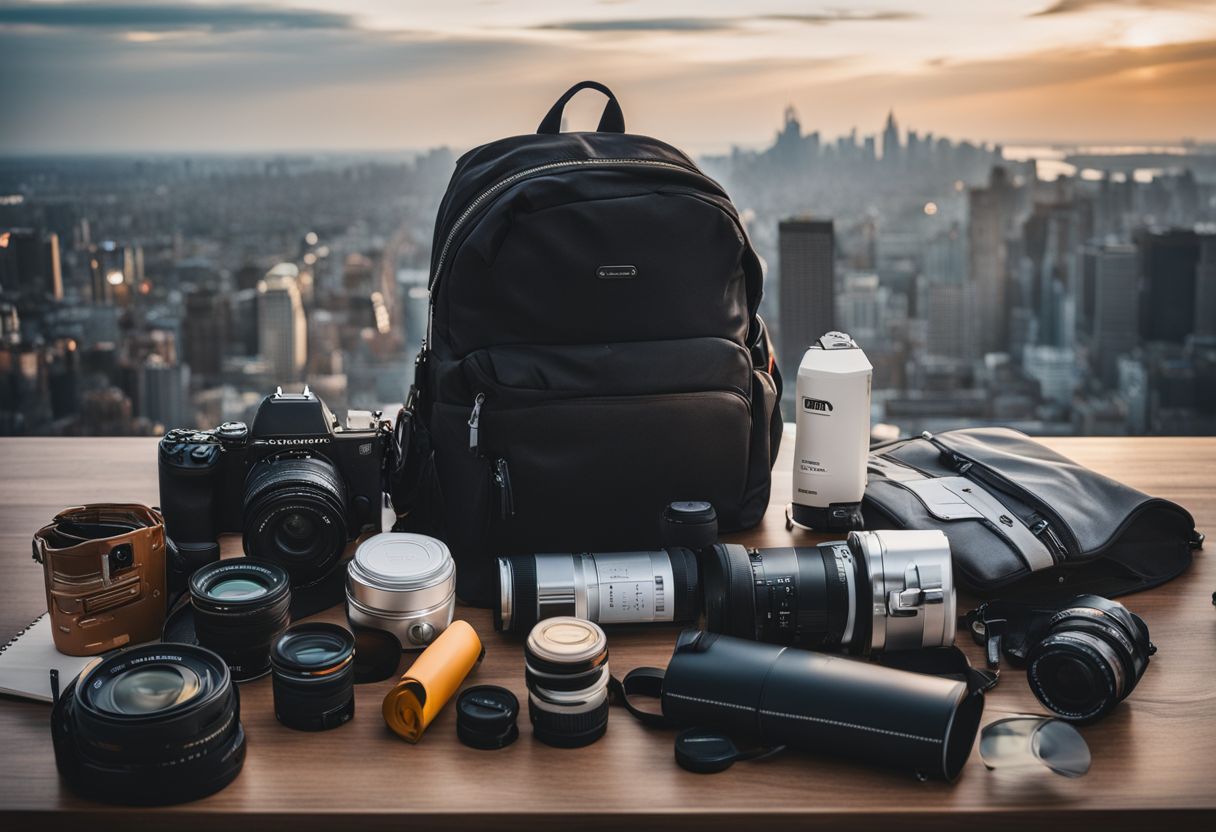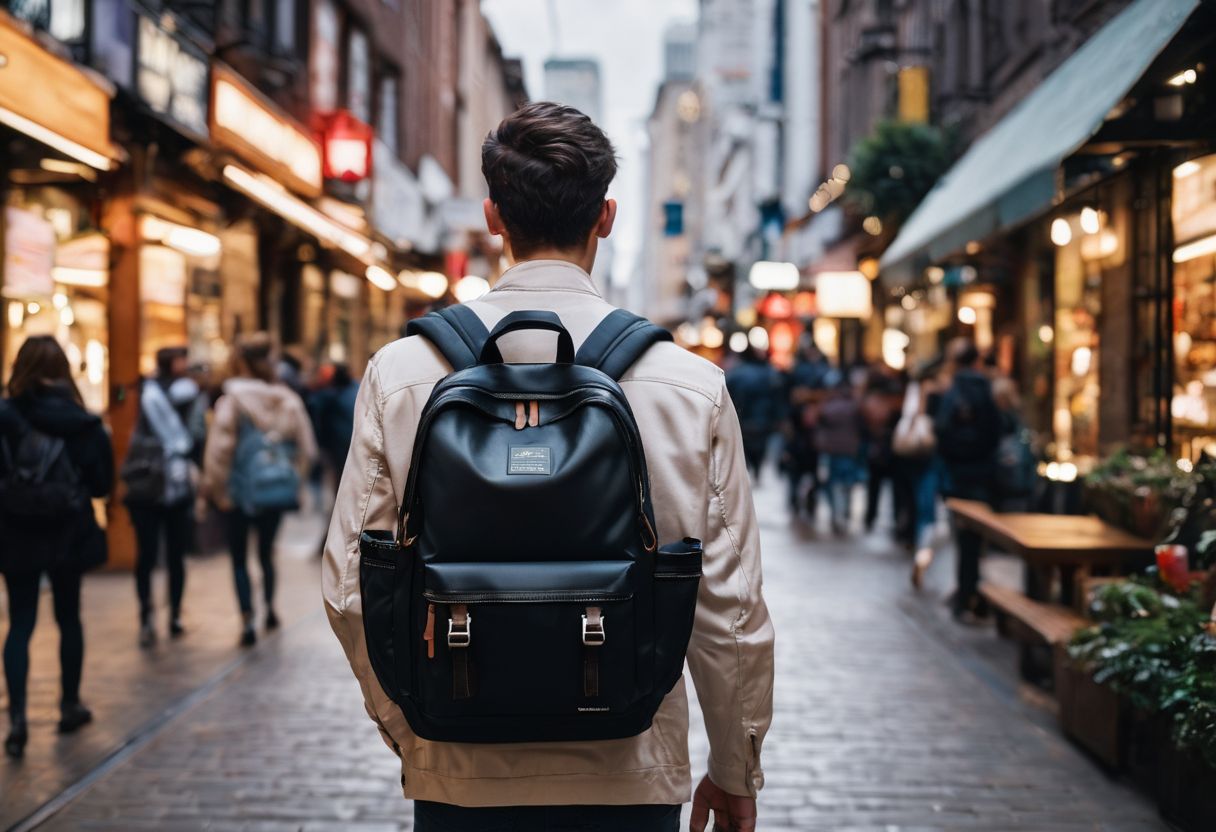
Selecting the ideal rucksack for urban commuting can be as complex as navigating city streets themselves. Many commuters grapple with finding a balance between space and portability, often sacrificing one for the other.
With over a decade of experience in outdoor equipment design, I’ve watched countless urban adventurers struggle to choose gear that meets their needs without weighing them down.
The average daily commute involves carrying more than just your lunch; it’s about accommodating laptops, documents, gym clothes, and sometimes even an extra pair of shoes. A study shows that choosing the wrong backpack can lead to physical strain and discomfort—this is where precise rucksack sizing becomes crucial.
This article will arm you with insights on selecting a rucksack that marries capacity with comfort specially tailored for city life. Discover your perfect fit here!
Key Takeaways
- Understand the importance of rucksack capacity for urban commuting and how it affects comfort and convenience during daily travels.
- Learn about different rucksack sizes (small, medium, large) tailored to fit various needs and preferences, such as accommodating work essentials, gym gear, or weekend trip items.
- Consider essential features when selecting a commuter backpack – style, comfort, durability, laptop access and protection, organization pockets, and water resistance. These factors contribute significantly to the practicality and suitability of the rucksack for urban commuting.
What is Rucksack Sizing?
 Understanding backpack capacity is essential for urban commuters. Different sizes cater to different needs, making it crucial to find the right fit for your daily essentials and commute style.
Understanding backpack capacity is essential for urban commuters. Different sizes cater to different needs, making it crucial to find the right fit for your daily essentials and commute style.
Understanding backpack capacity
Backpack capacity tells you how much stuff your bag can hold. It’s measured in liters (L). A bigger number means more space. Imagine filling your backpack with milk cartons; that’s what the liter size is like.
Each backpack has a different job. Some are small and just right for a few things, while others are big and carry a lot. Think about what you will put inside. Will it be clothes, books, or maybe your laptop? This helps you choose the right size.
You want to make sure everything fits without squishing or getting lost at the bottom of the bag. Pockets help keep things neat and easy to find. Picture putting all your important stuff in these pockets so they stay safe and sound.
Different sizes for different needs
Just like people, rucksacks come in many sizes to suit different jobs. Imagine a small backpack that fits just your lunch and tablet; this is less than 19 liters and perfect for quick trips around town.
For those who might need an extra sweater or a pair of shoes, medium backpacks ranging from 20 to 29 liters offer more space without being too big. But if you’re the type to carry gym gear, books, and a laptop all at once, then a large backpack between 30 and 39 liters will be your best friend.
Each size has its place in urban commuting. Think about what you’ll take with you every day – do you bring lots of things or just a few? Your answer will help decide which size is right for you.
Large rucksacks are great for longer distances where you might need more stuff, while smaller ones work well when traveling light is key. No matter the distance or load, finding the right fit ensures comfort on your journey through city streets.
Finding the Right Size for Urban Commuting

When it comes to urban commuting, the right backpack size is essential. Small backpacks (less than 19L), medium backpacks (20-29L), and large backpacks (30-39L) all cater to different needs and preferences.
Small backpacks (less than 19L)
Small backpacks, often less than 19 liters in size, are perfect for urban commuting. They offer a balance between being compact enough to carry comfortably and having enough space for your daily essentials.
Medium backpacks (20-29L)
When considering backpack sizing for urban commuting, medium-sized backpacks ranging from 20 to 29 liters are versatile and practical. These backpacks cater to a variety of needs, providing ample space without being too bulky. Here are some key points to consider when looking at medium-sized backpacks for urban commuting:
- Spacious Compartments: Medium backpacks in this size range offer roomy main compartments, suitable for carrying daily essentials such as books, a change of clothes, lunch, and more.
- Everyday Basics: These backpacks are ideal for everyday carry needs, offering enough space for items like notebooks, water bottles, snacks, and other personal belongings.
- Light Load Capacity: Medium-sized backpacks can comfortably accommodate light loads and are sufficient for carrying 13-inch laptops or tablets along with other essentials.
- Popular Choice: A medium-size backpack in the range of 24-26 liters is considered one of the most popular choices for school or work commutes due to its balance between capacity and portability.
- Trip Length Consideration: When selecting a medium rucksack for urban commuting, it’s important to consider the length of your commute and ensure that the capacity matches your daily requirements.
- Cubic Inch Measurement: Keep in mind that the volume of a mid-sized backpack can be measured in cubic inches, making it easier to compare sizes and understand the available space.
- Sizing Guides: Utilize backpack sizing guides that take into account various features in addition to size, helping you choose the right medium-sized commuter backpack based on frame type and specific requirements.
Large backpacks (30-39L)
Large backpacks, ranging from 30 to 39 liters in capacity, are ideal for urban commuting and weekend trips.
- These spacious backpacks provide ample room for daily essentials and offer versatility for various needs, including gym use and travel requirements.
- The 30 – 39L size is suitable as a commuter backpack due to its capacity and practicality for organizing work or school items.
- Their generous space makes them fitting for weekend trips, allowing you to pack clothing and other necessities without feeling limited by space constraints.
- Larger backpacks in this range are suitable as gym bags, accommodating workout gear along with everyday essentials.
- Their capacity and versatility cater well to the demands of urban commuting while also meeting the requirements of short travel ventures.
What to Look for in a Commuter Backpack
Consider the style, comfort, durability, laptop access, organization pockets, and water resistance when choosing a commuter backpack.
Style
When choosing a commuter backpack, style is an important factor. Look for a functional design that suits your urban environment. A rucksack with a symmetrical silhouette and square shape can offer both practicality and aesthetic appeal.
Durable materials and easy access pockets are also essential for a city backpack.
The ASP Rucksack, known for its large capacity and comfort, is popular among urban commuters due to its stylish yet functional design. Additionally, comfortable straps play an important role in ensuring that the backpack not only looks good but also feels good on your commute.
Comfort
Comfort is crucial when selecting a commuter backpack. Look for well-padded shoulder straps and breathable materials to ensure comfort during long commutes. Additionally, ergonomic designs with ventilated back panels can help prevent sweating and discomfort.
In addition to this, finding a backpack with adjustable straps and comfortable back support will also contribute significantly to your overall comfort while commuting. Seek out versatile carrying options or a weight distribution system that can be adjusted according to your specific needs for added comfort throughout the day.
Remember, a comfortable backpack will make your urban commuting experience much more enjoyable and convenient.
Durability
When it comes to durability, finding a commuter backpack that is built with quality and resilience is essential. Look for sturdy materials like heavy-duty nylon or polyester that can withstand daily wear and tear.
Reinforced stitching and solid construction contribute to the backpack’s longevity and reliability in urban commuting environments. Additionally, selecting a backpack with robust zippers, strong buckles, and durable hardware ensures that the bag can endure frequent use without compromising its functionality.
Water resistance is also crucial for ensuring durability in various weather conditions during urban commuting. A backpack with a water-resistant exterior or integrated rain cover helps protect your belongings from moisture, enhancing the overall endurance of the bag.
Finally, consider the overall suitability of the backpack based on its design and build quality to ensure that it meets both your functional needs and long-term durability requirements.
Navigating through bustling city streets requires a resilient companion by your side – one equipped to withstand everyday challenges such as crowded subways or unpredictable weather conditions.
Laptop access and protection
Ensure your urban commuter rucksack offers separate padded compartments for laptops and tablets. Look for a backpack with a dedicated laptop sleeve to keep your device secure from bumps and scratches during your commute.
Choose a bag that provides easy access to your laptop, allowing you to retrieve it quickly when needed.
Select a backpack with enhanced protection features such as reinforced padding or additional cushioning around the laptop compartment. This will help safeguard your valuable electronics from accidental impacts while on the move.
Remember to prioritize both accessibility and protection when considering a commuter bag for carrying your laptop and other electronic devices, ensuring they remain safe in various urban environments.
Organization pockets
When it comes to finding the right commuter backpack, having adequate organization pockets is essential. These internal and external pockets provide dedicated spaces for items such as keys, phone, or small gadgets, allowing for easy access and reducing clutter inside the bag.
Urban backpacks often feature multiple compartments and zippered pockets designed specifically for organizing daily essentials in a practical and efficient manner.
Bike commuters may benefit from internal zippered pockets that keep valuables secure while on the move. Additionally, minimalist urban backpacks offer large “floating” pockets on the exterior for quick access to frequently used items like water bottles or sunglasses, enhancing convenience during city commuting.
Water resistance
When choosing a commuter backpack for urban commuting, it’s crucial to prioritize water resistance. Look for a backpack with quality waterproofing to protect your belongings from rain and moisture.
A water-resistant commuter backpack should have dedicated compartments and be equipped with weatherproofing features to ensure the safety of your items in all weather conditions. The Rapha Roll-Top Commuter backpack, known for its water-resistant design, is highly recommended for urban cycling as it provides excellent protection against the elements.
In your search for the perfect commuter backpack, remember that water resistance is not just about keeping your belongings dry during unexpected showers—it’s also about ensuring that your essentials are safeguarded from any moisture or dampness encountered on city streets.
Tips for Choosing the Right Rucksack Size
Consider your daily essentials and commute needs when selecting the ideal rucksack size. Keep it lightweight for added comfort, and ensure proper weight distribution to avoid strain.
To learn more about finding the perfect rucksack size for urban commuting, read on for helpful tips and guidelines.
Consider your daily essentials
When choosing a rucksack size for urban commuting, think about your daily essentials. If you need to carry a laptop, consider a backpack with dedicated protection and easy access. For those who often bring extra clothes or work materials, a medium-sized pack might be suitable.
Also, if you typically carry minimal items, a smaller backpack would suffice.
Don’t forget to factor in other daily necessities such as water bottles, snacks, or personal care items when selecting the right rucksack size for urban commuting. Balancing these practical needs will ensure that your chosen backpack size meets your everyday requirements without being too bulky.
Keep it lightweight
When choosing a rucksack for urban commuting, it’s essential to keep it lightweight. Opt for lightweight materials and minimalistic designs to reduce strain on your shoulders and back during daily use.
Look for compact yet durable options that prioritize functionality without adding unnecessary weight.
Consider the practical benefits of a lightweight backpack, such as effortless mobility in crowded city spaces and less strain on your body during prolonged commutes. By keeping it lightweight, you can navigate urban environments with ease while staying comfortable throughout your journey.
Consider the weight distribution
When choosing the right rucksack size for urban commuting, it’s important to consider the weight distribution. A well-balanced load can help reduce strain on your back and shoulders.
Look for backpacks with padded shoulder straps and a waist or chest strap to distribute the weight evenly across your body. Additionally, opt for backpacks with multiple compartments to organize your items in a way that keeps the heaviest objects closer to your body, promoting better balance.
A balanced weight distribution is crucial for comfort during urban commuting. By ensuring proper weight distribution in your rucksack, you can minimize strain on your body and enjoy a more comfortable journey.
Consider your commute needs and style preferences
When choosing a commuter backpack, consider your daily travel needs and personal style. If you have a short commute and only need to carry essentials like your keys, wallet, and phone, a small backpack (less than 19L) may be suitable for you.
For longer commutes or if you need to carry items like a laptop, lunch, or gym clothes, a medium-sized backpack (20-29L) could be more practical. Those with extensive storage requirements or who prefer to pack extra items may find larger backpacks (30-39L) better suited for their needs.
In addition to capacity considerations, think about the style that suits your urban commuting activities best. Do you prefer a sleek and minimalist design? Or perhaps you favor added features such as multiple pockets for organization? Assessing your functional necessities alongside your fashion preferences can guide you in selecting the right size and style of rucksack that aligns with both your practical needs and personal taste.
Conclusion
Rucksack sizing is crucial for urban commuting. The right backpack size can make your daily travels more efficient and comfortable. By considering your essentials and weight distribution, you can choose the perfect fit for your needs.
Remember to prioritize style, comfort, durability, laptop access, organization pockets, and water resistance when selecting a commuter backpack. Finding the ideal rucksack size can streamline your commute and enhance your overall experience.
Use these tips to select the best rucksack size that suits both your practical needs and personal style preferences.
FAQs
1. How do I know what size rucksack is suitable for urban commuting?
Choose a rucksack that comfortably fits your laptop, work essentials, and any additional items you need for your daily commute.
2. What features should I look for in a rucksack for urban commuting?
Look for a rucksack with padded shoulder straps, multiple compartments for organization, a padded laptop sleeve, and water-resistant material to protect your belongings from the weather.
3. Can I use a regular backpack for urban commuting?
Yes, you can use a regular backpack as long as it is comfortable to wear and has enough space to carry your daily essentials. However, specialized commuter backpacks often have added features suited for city travel.
4. Is it important to consider the weight of the rucksack when choosing one?
Yes, it’s important to choose a lightweight rucksack to avoid strain on your shoulders and back during urban commuting.
5. Should I prioritize style or functionality when selecting a rucksack for urban commuting?
Prioritize functionality over style when choosing a rucksack for urban commuting since it needs to be practical and comfortable while carrying all necessary items throughout the day.

